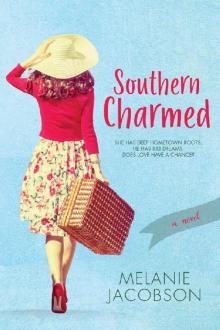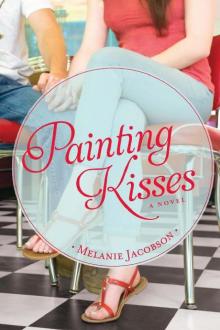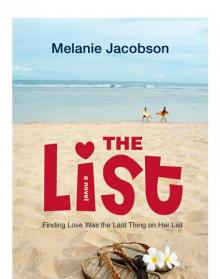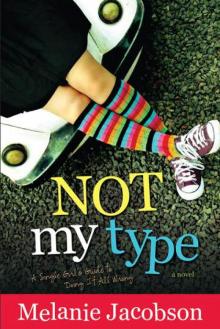- Home
- Melanie Jacobson
Wedding Belles: A Novel in Four Parts Page 3
Wedding Belles: A Novel in Four Parts Read online
Page 3
“Hi,” he said, looking up from a refrigerated case. He was unpacking containers of chopped vegetables and herbs.
“Hey. You good to go?” She looked around and frowned. “It’s just you today?”
He shrugged. “I got up at four and prepped everything. It’ll still be fresh and I’ll be able to throw things together and run the register. I modified the menu to make sure I could handle a crowd by myself.”
“Interesting,” she said, impressed that he’d gotten up so early to prep. She realized she’d downgraded her expectations after catching sight of his tattoos, as if they somehow meant he wasn’t going to take the gig seriously. But his whole demeanor suggested he took everything too seriously, especially himself. Her stereotypes about tattoos was one of the biases she’d carried with her from her childhood neighborhood, where the rough boys and hard girls had inked themselves as a sign of . . . she wasn’t sure. It wasn’t even rebellion. No one thought twice about tattoos. Except her. Her mother would have killed her three times over if she’d come home with a tattoo.
Hers would have been pretty, though. And small. No flames. Or skulls. Maybe a bluebird, a tiny one somewhere easy to cover.
Not that she’d spent a lot of time thinking about it.
But it definitely would have been a bluebird. Not a cartoony one. A realistic one.
“Was there something else you needed?”
She blinked, mortified to realize she’d been staring at his full dragon tattoo, which was brighter and more beautiful than she’d expected. “Um, no. You know where to find the generator hookups and the bathrooms?”
“Yeah, I saw the fancy toilet rig. Looks like you covered every detail.”
She smiled. Given the demographics for the average hospital donor, she’d gone upscale everywhere she could, including renting a bathroom trailer that felt more like an actual restroom than a bunch of wobbly portapotties.
“Good luck today,” she said, climbing down from the truck. He was already elbow deep in the cooler again, and she closed the door on what sounded like an absent-minded grunt of thanks.
She headed to the entrance and unhooked the red velvet rope to welcome the small crowd that already waited, beaming as they streamed past and scattered in every direction, each parent pulled by a kid who wanted to look at something different. That’s exactly how a successful carnival began.
“Harper!”
She waved at Miriam Tradd, the chairman of the hospital board of trustees, delighted to see her. The woman was as dressed down as Harper had ever seen her in linen pants and a string of small pearls. It was practically sporty for the elegant Miriam, and it made Harper grin.
“It looks good,” Miriam said, surveying the large field again. “I had my doubts when you suggested this location, but it’s hard to beat free. And then you worked a miracle on top of that. Is it really possible we’re going to make money even with the expense of the ride rentals?”
Harper grinned. “The booth rentals already covered the cost of bringing in the rides, and we’ll get another ten percent of their craft sales. We didn’t have to pay any food vendors. The trucks will keep whatever they make, but we had no overhead there. It’s the games that’ll rake in the money.”
They both turned to study the nearest one, a horse-racing game Delmar Woodson had built. Players sat on stools in front of Super-Soakers, firing to fill jugs that pulled a small cutout horse forward the faster they filled. Harper didn’t quite understand the mechanics of it, but she didn’t need to. All she needed to understand was that every stool was occupied, and at least one person waited behind each player for their chance. A racer would have to win three times in a row to pick a prize but still pay each time to play. “We’re going to make far more than we give away,” she said.
Miriam sniffed the air. “Why, I do believe I smell a proton accelerator in our very near future.” She sniffed one more time. “And funnel cake! I love funnel cake.”
“Then you should get some. And Miriam? Thanks for giving me the chance,” Harper said.
Miriam touched her arm, a gentle, fleeting touch but it warmed Harper straight through. “Are you kidding me? There is nothing we love more than our graduates coming back to work for us.”
“You should have let me do this for free,” she said.
“Absolutely not,” Miriam said. “And if you try to donate your fee, I’ll just cut a new check and send it out again until you’re tired of playing tag. Besides,” she said, winking. “You’re half the price of the company we used last year, and so far twice as good.”
Harper burst out laughing, strangely mollified to know that she’d been a steal. “It is good, isn’t it?”
“It’s excellent. Well done.”
A steady stream of families flowed through the entrance and filled the grounds. Harper was happiest of all knowing that many of the kids running from booth to booth or screaming with delight from the top of the Zipper were survivors like her, well enough to participate in regular kid things. And while some of them sat in wheelchairs, there were smiles everywhere.
Harper was lucky. She’d had acute leukemia and the doctors caught it early. She’d spent her share of days in the hospital, and she’d always bear some physical scars from her fight. But she’d beaten it, and her good memories of the staff outweighed bad ones of the difficult medical treatment. She had to blink back a rogue tear as she watched dozens of kids and families she knew were fighting similar battles.
There had to be a way she could return her event fee to the hospital without Miriam catching on. She’d figure it out. She pulled out her phone and added it to her to-do list. The to-do list was almighty, and that meant giving that fee back was as good as done.
She scrolled through her event list, pleased at the number of completed items and mentally calculating the most efficient way to get the next items done. Time for another perimeter walk to make sure the crowd flow was good, especially to the money-making games booths.
When she swung past Zak’s truck again, her eyes widened at the signs he’d set out. When she’d stopped by his street gig, she’d been impressed with the clean, stylish font of his painted menu board and the simplicity of his offerings. He’d gone the other direction now with a chalkboard menu, each dish offered in a different color. A sinuous chalk dragon wound around the edges. It looked a lot like the tattoo on his arm.
He’d stuck with a few dishes, but he’d changed the name of them. The Korean shrimp and grits she’d enjoyed had become Dragon Tail, and he had another dish called Dragon Meat and yet another named Weeping Warrior. Posters cautioned people to try Weeping Warrior at their own risk. “Extreme Heat Warning. Bold Eaters Only.”
She missed the minimalism of his old approach, but he was smart to tailor his offerings to the carnival atmosphere. And it was working. He had a line of men plus one teenaged girl as long as any of the lines at other trucks.
Between the awning and the reflection on his window, she couldn’t see Zak clearly, only his hands flashing out now and then to take a customer’s money or a few minutes later to hand them their order. But she quickly realized that while he had a line as long as the other trucks, it was partly because it moved more slowly as he ran his one-man show.
She shook herself out of her semi-trance and moved on. That wasn’t her problem to solve. She’d gotten him a good gig. It was on him to make the most of it. And yet . . . she didn’t like it when systems worked inefficiently. Maybe there was a process she could recommend to help him serve customers faster. But when she positioned herself in front of his truck to study it again an hour later, the line was moving at the same speed as the other trucks. And it was longer.
Huh. Good for him.
When the lunch rush died down in mid-afternoon, she couldn’t resist checking in to see what had changed. And also, she had a hankering for his Seoul grits, of all things. Apparently, the cotton candy she’d been snagging wasn’t enough to sustain a working woman through a warm spring afternoon.
&nbs
p; She stepped up to his window to order, and a teenage girl leaned out.
“What can I get for you?”
Harper spotted the outline of Zak’s broad shoulders at the grill. “A word with the chef, please.”
“Mr. Choi,” the cashier called over her shoulder. “Company.”
“Zak,” he growled, turning. He sounded like he was tired of issuing the same correction.
The girl just grinned and said, “Sure, Mr. Zak.”
He shook his head, but his brow smoothed when he saw Harper. “Hi. Come on back.” He pointed toward the truck’s rear door, as if Harper should meet him there. He opened it and came down to the last step. Harper had to crane her neck to meet his eyes. He was much taller than her, and she was 5’7, tall for a woman.
“Hey,” she said. “I was thinking about trying the Weeping Warrior, but I don’t know if I’ve got the guts.”
“I can handle the spice even with my weak white genes.”
She had no idea how she was supposed to respond to that, but he flashed a smile like the one he’d given her his first day in her office. Genuine. She hadn’t seen it since and had the odd thought that she’d missed it.
“Kidding,” he said. “I have no weak genes. My white genes are awesome too.”
She laughed. She couldn’t help it. “Which ones helped you get your line running faster?”
“White genes, but they weren’t mine.” He jerked his thumb over his shoulder at the slight blonde. “That crazy girl was in my line, and when she got to the window she said I was losing business and even a monkey could run the register, so I should let her do it. I said no. She said she’d do it for tips. I decided to let her work for ten minutes so she could see that it’s not so easy. Except that was all the time it took for her to get the line humming.”
“Those weren’t white genes at work. Those were her female genes kicking in. We’re smart like that.”
“Sexist.”
“True.”
He nodded. “Yes. True.”
“But also, I don’t think this arrangement is legal.”
“It’s definitely not, but her parents popped by looking for her and they’re fine with it, so I let her stay. And I got their number if I ever need her for a gig again.”
“So it’s going well.”
He grimaced. “I hate playing up stereotypes to sell food, but it’s working.”
She touched his arm, the one with the tattoo, and then snatched her hand back. Why had she touched him? Way to be weird. “You do seem to have an honest thing for dragons.”
He laughed. “Eighteen-year-old me did. Ten-years-later me is just living with it.”
“Which version of Crossroads Catering is going to show up for the Ravenel wedding?”
He ran his hand through his dark hair. “Look, I’m always going to do my food, but I promise to do it in a way that gets the check written. I’ve got ideas. Let me work on them a little more. But I promise you won’t be sorry for choosing me.”
Harper didn’t tell him she was still questioning her impulsivity. If she’d taken a day or two to do some research, she could have worked out a compromise to keep both Dahlia and her groom happy, and most importantly, Mrs. Ravenel. But she’d panicked when she thought she was about to lose the booking, and now she was committed to the chef standing in front of her, sweaty from the truck kitchen, dragon peeking out from the rolled up sleeves of his chef smock, eyes studying her with a growing warmth that made her realize she was staring. Again.
She pulled her phone from her pocket, pretending she’d gotten a text. “Better go check on the carnival games.” That was true, at least. “Good luck for the rest of the day.”
He gave her a salute, but he’d barely made it back up the steps when she turned and jogged back to the window, knowing she wore a sheepish expression and unable to help it. “Um, I think I’d like to stick with the grits. I mean,” she squinted at the chalkboard, “some dragon tails.”
“Ten dollars,” said the girl at the window. She’d written “Taylee” on a piece of masking tape and stuck it to her shirt like a nametag.
“She eats free,” Zak said, climbing back into the kitchen. “She’s the whole reason we got this job.”
Taylee shrugged and cancelled the sale, but Harper stuck the money in the tip jar, which earned her a huge smile when Taylee handed out her food a few minutes later.
She lifted a forkful in a toast of thanks to Zak and took her first bite as she walked away.
The warm burst of flavors stopped her in her tracks and she gave them a minute to wash over her taste buds before she started back up again.
Zak might be vaguely irritating with his irreverent sense of humor and his touchy ego. But dang if he wasn’t exactly right about his food genius.
Chapter Four
Zak watched Harper walk away, even leaning out of the window to stare after her until Taylee gave him a strange look that made him realize he was being a creeper.
But this Harper in her jeans and soft blue sweater was a surprise to him. He’d seen her twice in ladylike dresses and perfect hair, but she’d dressed down for the carnival. Even her hair, which she’d pulled into a ponytail. The way she’d fit those dresses hadn’t prepared him for the justice she did to a pair of jeans. She had a sweet—
Oh, yeah. He was definitely being a creeper.
He spun back to his grill and prepped the next batch of chicken for the Devilbird Wings, which was the dish that had sold so well at Little League. It was popular here too. He was almost worried he wouldn’t have enough food to keep up with the crowd, which was the first time he’d ever had that problem since driving his lime green truck down to Charleston.
It was a good problem to have, considering.
They served steadily through the afternoon, but whenever he got a chance, he watched for Harper through the window. She was easy to spot weaving briskly through the crowds, stopping at this booth to check with a vendor, that game to chat with whichever old man was running it.
She often brushed her ponytail back when it fell forward on her shoulder. It was a long rope of . . . what was that color? Caramel? No. Too light. Raw honey. That was it. Her hair was gathered into a rope of raw honey.
Several times he spotted her by an insane-looking ride with death trap cages that flipped and spun while they rotated around a vertical track. It was like a compressed Ferris wheel, only the seats were enclosed so they could spin wildly as they traveled the long, tall loop. He didn’t blame her. She was probably checking to make sure it was still safe to operate. He was more of a regular Ferris wheel guy himself. Except he didn’t really like those, either. Maybe a carousel. That was more his speed. Literally.
The early dinner crowd heated up, and Taylee’s parents checked on her a couple of times. She was happily ringing up the rush. The tip jar filled with every smart remark she made to the customers. They liked their Korean-fusion with a side of sass, it seemed. He shook his head, smiling to himself. He’d felt bad only being able to offer her tips, but she was making out like a bandit.
The evening brought another surprise: lots more women were finding his line and then exclaiming over his food. Word of mouth was spreading. Finally, a little after eight, the crowd thinned as families with worn out children carted them away. Taylee’s parents stopped by again, and Zak waved her off.
“Take the money and run,” he told her. To her parents he added, “Your daughter is an excellent worker.”
Her dad smiled proudly and confirmed that Taylee could work for Zak again any time she was available, but not under the table. Taylee hugged the stuffed tip jar. She looked as if under-the-table payments suited her just fine, but Zak laughed and promised he’d make it legit the next time he got a good opportunity.
And this had been a great one. He hadn’t done more than break even since he’d moved to Charleston, and now he was ahead for the first time. Harper might be a micromanager, but he owed her.
He closed the awning on the truck and set
to work packing up. When he’d bleached all the food prep surfaces and locked up the coolers, instead of climbing into the cab and driving off, he got out to wander the grounds. The old guys were packing up their games, and a handful of stragglers wandered toward the parked cars with large stuffed animals or balloons in tow.
He wasn’t looking for anything in particular, just taking it in. This wasn’t the kind of thing he’d had growing up in Brooklyn unless you counted Coney Island, which he didn’t. This little enterprise was a sweet Carolina-ed version of that, and even just wandering through, he liked it better than the raucous Coney Island trips of his misspent youth.
The only thing he didn’t see—not that he was looking for it—was a honey rope of hair among the booths, not near the quilter folding her blankets into plastic bags or the jewelry-maker stacking trays of handmade earrings. And then he felt a tickle of satisfaction somewhere in his chest when he finally glimpsed a flash of dark blonde as the lights of a ride washed over Harper. She sat in the back of a booth, bent over a table.
Might as well say hello. So he did.
Her head shot up, and she blinked at him then smiled. He could almost hear the sound of grinding as she switched gears. “Hey,” she answered. “Have a good night?”
“Great night.” He felt a hundred pounds lighter. Maybe he’d sweated it all out. Maybe he hadn’t realized how heavy the burden of scraping by had been until it was lifted.
For the first time he noticed an elderly gentleman sitting next to Harper, his sparse gray hair tufted in a way that put Zak in mind of a startled owl. “What are you guys up to?” He ducked beneath the canvas awning to take a closer look. It had been a game booth, he guessed, based on the painted wooden horse figures and water guns lying on the ground.
The little owl man gave a rueful laugh and waved at the pile of tickets he’d collected. “I was a designer, not an accountant. I lost track of the tickets, so Harper here is saving me from my own stupidity.”
“You’re a genius, Del. You made us a fortune. Your game will literally save lives.” Harper didn’t sound prepared to entertain an argument on the subject. “You put us halfway to our goal with this booth alone.”

 Southern Charmed
Southern Charmed Kiss Me Now: A Romantic Comedy
Kiss Me Now: A Romantic Comedy Painting Kisses
Painting Kisses Wedding Belles: A Novel in Four Parts
Wedding Belles: A Novel in Four Parts The List
The List Not My Type
Not My Type A Timeless Romance Anthology: Summer Wedding Collection
A Timeless Romance Anthology: Summer Wedding Collection